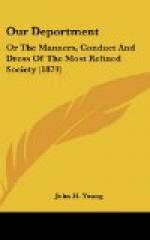It is said: “A bow is a note drawn at sight. You are bound to acknowledge it immediately, and to the full amount.” It should be respectful, cordial, civil or familiar, according to circumstances. Between gentlemen, an inclination of the head, a gesture of the hand, or the mere touching of the hat is sufficient; but in bowing to a lady, the hat must be lifted from the head. If you know people slightly, you recognize them slightly; if you know them well, you bow with more familiarity. The body is not bent at all in bowing; the inclination of the head is all that is necessary.
If the gentleman is smoking, he withdraws his cigar from his mouth before lifting his hat to a lady, or if he should happen to have his hand in his pocket he removes it.
At the moment of the first meeting of the eyes of an acquaintance you bow. Any one who has been introduced to you, or any one to whom you have been introduced, is entitled to this mark of respect.
The bow is the touchstone of good breeding, and to neglect it, even to one with whom you may have a trifling difference, shows deficiency in cultivation and in the instincts of refinement. A bow does not entail a calling acquaintance. Its entire neglect reveals the character and training of the person; the manner of its observance reveals the very shades of breeding that exist between the ill-bred and the well-bred.
RETURNING A BOW.
A gentleman walking with a lady returns a bow made to her, whether by a lady or gentleman (lifting his hat not too far from his head), although the one bowing is an entire stranger to him.
It is civility to return a bow, although you do not know the one who is bowing to you. Either the one who bows, knows you, or has mistaken you for some one else. In either case you should return the bow, and probably the mistake will be discovered to have occurred for want of quick recognition on your own part, or from some resemblance that you bear to another.
THE MANNER OF BOWING.
The manner in which the salutation of recognition is made, may be regarded as an unerring test of the breeding, training, or culture of a person. It should be prompt as soon as the eyes meet, whether on the street or in a room. The intercourse need go no further, but that bow must be made. There are but few laws which have better reasons for their observance than this. This rule holds good under all circumstances, whether within doors or without. Those who abstain from bowing at one time, and bow at another, should not be surprised to find that the person whom they have neglected, has avoided the continuation of their acquaintance.




